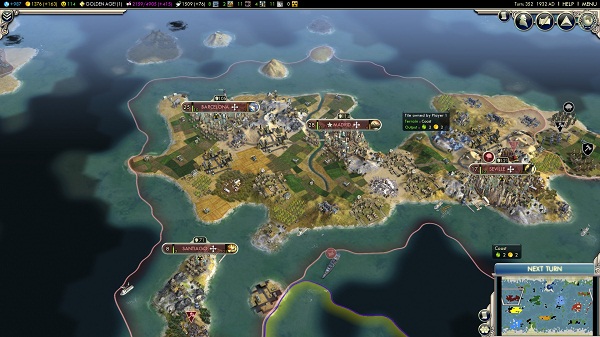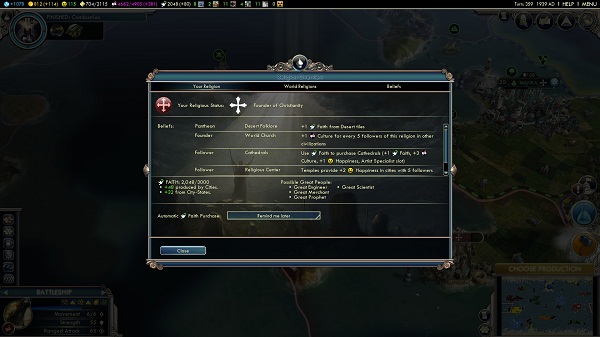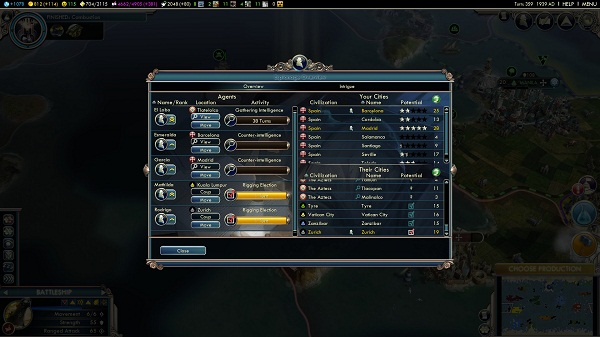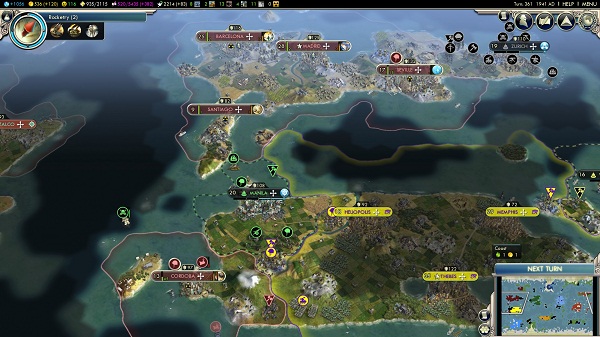
Civilization 5, when it came out a year ago, won considerable acclaim from game critics, even though it was savaged by some fans for dumbing down the game.
Diplomacy was dumb. Global happiness instead of per city. One unit per tile. Inability to trade technologies. Buggy interface.
Being a long-time fan of the series — I’ve played every Civilization, and even off-shoots like Alpha Centauri and Colonization — I really liked Civilization 5. Sure, the game is less complex, but in a good way, and is overall really fun.
Now, a year later, Firaxis has released the definitive expansion pack for Civilization 5: Gods and Kings. Launched just late last month, Civ 5 Gods and Kings adds religion and espionage to the mix, throws in nine more civilizations, a tweaked technology tree, and more world wonders.
And when I finally got down to playing Civ 5 Gods and Kings, the same thing happened to me when I played last year: Late nights and bleary eyes as I stayed up way too late on a working day playing the darn game.
“One more turn,” you think, and before you know it, it’s 2.30am in the morning and you have to be in the office at 9.00am sharp for a conf call.
Ok, here’s the lowdown on this game. If you hated Civilization 5 when it came out last year, chances are likely you’ll still hate the expanded game. The new bells and whistles — religion, esponiage, more technology, more units, etc. — probably won’t impress you, but the diplomacy and AI tweaks might.
And if you really like Civilization 5, then Gods and Kings is the definitive expansion pack for the game. It’s better than all the other DLCs that Firaxis has released for the game thus far.
Religion: the third tree

Religion is one of the new mechanics that has been added to Civ 5 in Gods and Kings. Beyond the science-based technology tree and the culture-based social policies tree, religion is a third tree that you now have to worry about.
Although faith, the new resource for religion, might on surface initially seem pretty similar to culture, the resource for social policies, it plays quite differently.
Religion’s power comes when it spreads to other cities around the world (especially those not in your civilization) and can play a major role in shaping diplomacy, whereas culture affects your own cities in your civilization.
I also like the fact that they added a bit of tension in the game. The number of religions that can be founded are less than the total number of civilizations, and every time you progress in the religion race, you take can take a religious perk which will be made unavailable to the rest of the religions.
For example, you can take “God of the sea”, a perk that states that all fishing boats produce an extra production hammer, and no other religion can take this perk.
Religion, however, affects all cities that is converted by it, not just your own. For example, if a religion spreads to an opponent’s city, that city will also partake in that religion’s perks. As a founder, however, you will gain some additional benefits, so it’s still very worth it to found religions.
However, religion is more of a supplementary resource, as it does not directly contribute to one of the main four ways for you to win Civ 5: outright domination, diplomacy, science or cultural victory.
Religion is powerful in the early game, but as the game progresses to the late modern and information age eras, it becomes less and less useful.
Still, I found the religion mechanic to be a fun one. It’s thematic, it makes diplomacy more interesting, and is a useful supplementary resource, no matter what type of victory you’re going for.

Espionage: Spy vs. Spy
Espionage, however, was a bit of miss for me.
In theory, it sounds cool: Spies can steal technologies, rig elections or gather intel on other civilizations. You gain a spy from the beginning of the Renaissance era, and spies can even level-up when they carry out their duties as listed above or kill off an opposing spy.
In practice, however, espionage feels like an under-developed minor mechanic that doesn’t impact the game much.
As a catch-up mechanic if you’re behind in the tech race, it takes forever to steal technology, and the chances are not high. As a way to influence city states and affect diplomacy, I’d rather bribe them or complete quests.
And whilst a case could be made that the intel you get is interesting — for example, Queen Elizabeth is planning to backstab Napoleon of France soon, and you can share this with France to improve diplomatic ties — it often isn’t really that useful.

AI tweaks and diplomacy
The best part of Civ 5: Gods and Kings are not the two mechanics they added to the base vanilla game, but all the subtle tweaks that make the game play better.
Diplomacy feels more alive now. Civilizations will contact you to renew trade agreements and share intel. The AI, whilst not perfect, doesn’t blindly throw units at you to be slaughtered by superior forces, as they used to do so in the past.
Unit health and strength have been re-jigged from a 10-point scale to a 100-point scale, which tends to make combat last longer and is more strategic. Naval ships have been re-tooled into ranged bombardment and melee options.
There are nine new Wonders, 13 new buildings, and 27 new units. The social policy and technology trees have been tweaked and expanded, and added to the game are new city states that offer unique commodities.
Additionally, the game ships with three new scenarios: A medieval world, the fall of Rome, and an alternative Victorian-era steampunk adventure.
That’s a decent amount of content for an expansion. In short, if you’re a big Civilization 5 fan, this expansion is easy to recommend.







